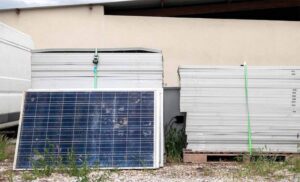When France foreign minister Laurent Fabius brought the gavel down on Saturday night and declared the Paris Agreement on climate change action was sealed, the reaction was almost immediate.
Within the conference hall it was greeted with cheers, hugging and great emotion. Outside, the agreement to cap temperature rises “well below 2°C” and as low as 1.5°C signalled a remarkable achievement that had one major implication: the end of the fossil fuel era is nigh.

The coal industry will, no doubt, try to comfort itself by saying that the agreement is loosely enough worded to give them some slack. One part of the agreement suggests, for instance, that the world should seek a peak in emissions “as soon as possible”. The head of the Minerals Council of Australia described the deal as “good news for coal.”
The Australian government may also be assuming that there will be business as usual. That could be one interpretation of the Coalition’s remarks immediately after the passage of the deal, when foreign minister Julie Bishop said it was a matter of balancing “economy and the environment”. It is hard to imagine any other national minister, apart from maybe the Saudis, who would use such language in Paris.
But if that is what the fossil fuel industry and the Coalition government are really thinking, then the evidence suggests that they are kidding themselves.
One little gem, alerted to me by the Potsdam Institute’s Malter Meinshausen (on the dance floor of the COP after party of all places) puts the agreement in a new perspective.
It is this paragraph, article 17, in the decisions text of the deal:
17. Notes with concern that the estimated aggregate greenhouse gas emission levels in 2025 and 2030 resulting from the intended nationally determined contributions do not fall within least-cost 2 ̊C scenarios but rather lead to a projected level of 55 gigatonnes in 2030, and also notes that much greater emission reduction efforts will be required than those associated with the intended nationally determined contributions in order to hold the increase in the global average temperature to below 2 ̊C above pre-industrial levels by reducing emissions to 40 gigatonnes or to 1.5 ̊C above pre-industrial levels by reducing to a level to be identified in the special report referred to in paragraph 21 below;
OK, now for a quick translation.
The world currently emits around 50 gigatonnes of greenhouse gas emissions a year. Even if all the pledges put together by 186 nations before and during the Paris climate talks were enacted, these emissions would grow to around 55 gigatonnes of GHG emissions a year by 2030.
But to meet the 2°C target, the world will need to reduce those emissions to 40 gigatonnes a year. And to reach that level, they are likely going to have to reverse direction before 2020.
What’s more, if the world does move to that aspirational goal of capping temperatures to 1.5°C above pre-industrial levels, then it is going to have to move a lot faster, and a lot more dramatically than that. That trajectory will be outlined by a new IPCC report due in 2018.
The Australia-German Climate and Energy College, of which Meinshausen is a member, published an analysis of what the Paris deal translates to in terms of energy and other emissions.
The analysis suggest that to get to that, a full decarbonisation of the electricity sector must occur by 2050. And even quicker if the world is aiming for “well below 2°C” as agreed in Paris, or the aspirational “1.5°C” goal.
The researchers note that achieving a “balance between anthropogenic emissions by sources and removals by sinks of greenhouse gases in the second half of this century” – as the text describes – puts the onus on reducing levels of CO2 first.
That’s because it is hard to imagine “negative” methane or nitrous oxide emissions, so the emphasis will be on achieving net zero CO2 emissions. Hence the focus on the energy and industrial sectors, and in a much shorter timeframe that than imagined by this year’s G7 meeting, which pointed to a timeline of around 2100.
Kobad Bhavnagri, the head of Bloomberg New Energy Finance in Australia, said that the Paris deal, although imperfect and falling short of a mandate to stop fossil fuel use, “naturally implies that global usage of coal will need to be curbed if the stated ambitions are to be met.”
He said Australia would need to deepen its current pledge of 26-28 per cent below 2005 levels by 2030 towards the 45-65 per cent range recommended by the Climate Change Authority.








